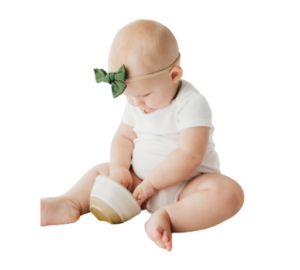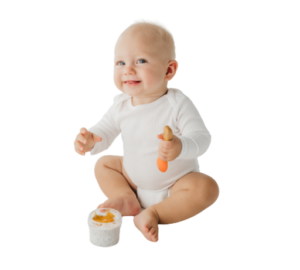FAQ’s
About the products
We focus on using seasonal ingredients grown for us by Cayman’s farmers. We prepare every order by hand and use none of the preservatives, salt, or sugar you may find in grocery store options. Our menu items are developed with a feeding expert to ensure your Tiny Spoon is consuming the right nutrients to maximize their development and long-term health.
Our products are prepared, packaged, and dispatched from our commercial kitchen where we maintain the highest standards in safety and hygiene.
We freeze our products to lock in nutrients and freshness. Our blends will last up to 3 months in the freezer and we label items with their best before date. Once thawed, keep refrigerated for up to 24hrs.
We chose recyclable packaging and our pods are made from coated kraft paper. The coating (polypropylene ‘PE’) is a plastic and of commercial plastics on the market today is considered one of the safest and is BPA & Phthalate-free. It is FDA-approved for food contact, so you’ll find polypropylene in food containers like those that hold yogurt, cream cheese, and butter.
We deliver across Grand Cayman and can deliver to your home or office. However, we recommend you be home to accept your delivery as our products arrive frozen and should be placed directly into the freezer.
Our products contain whole Cayman Grown ingredients. We may add a little filtered or cooking water but we keep our blends as fiber packed as possible which means they may be thicker than store-bought options. You can add water, breast milk or formula if you wish to create the desired consistency for your baby.
Since we source fresh ingredients direct from farms here in Cayman you may find natural variations in texture, flavor, and appearance from week to week. For example fibers from mango or stems of broccoli.
If you have any concerns just get in touch, we never want our parents to worry. Your Tiny Spoons are our number one priority!
Our Smooth and Chunky Meals are dairy free. Where we use plant milk in our multi meals we hand-make our own oat or light coconut milk to ensure it contains no sweeteners or preservatives. We heat treat (pasteurize) our coconut and oat milk as an additional safety measure.
Our Snacks and Multi Meals may contain allergens such as milk and cheese and it is always listed in the ingredient section online. For example, we use swiss cheese and eggs in our Cauli Cheese Cups.
Our resident feeding expert says ‘every time your child sits down to have a meal or snack, put a puree and a hard munchable on their highchair tray’. Why? Hard munchables help your child to practice moving hard solid food in their mouth without getting a piece off, the goal is not to bite off or swallow the food.
Tiny Spoons munchables are the perfect size, small enough to fit into the mouth but large enough so baby cannot get a bite off. Perfect for holding one end in baby’s hand and placing the other end in their mouth.
Your baby’s taste buds develop from the time they are in utero to their second birthday, and everything they encounter is shaping their taste buds and future preferences. At Tiny Spoons, we strive to provide parents with a variety to encourage frequent exposure to new foods.
The goal of introducing baby food flavors to your baby in a particular order is to help them learn how to tolerate a wide range of tastes. A variety of different colors and flavors of fruits and vegetables are needed for good nutrition. Remember to test each new food for possible allergic or food sensitivity reactions. If you would like more information on when and how to introduce food, please consult our feeding expert or your paediatrician.
Starting solids is a whole new sensory experience and it takes an average of 10 times of tasting a new food before a child will eat it on a consistent basis. It’s totally normal for them to make funny faces, spit out food, or eat small amounts during the early days of solids and this doesn’t necessarily mean they don’t like it.
The important thing is to continue to offer new foods and flavors to enable baby many opportunities to practice! A few tips from our resident feeding expert are:
- don’t assume that funny faces or gagging means a rejection of that food. With your happy face try telling them “You’re okay, that was a BIG taste. YUM”
- if rejected try mixing the new flavor with their preferred flavor and tell them “see, it’s a smaller flavor now”. After several spoonful of the mixed flavors try just a tiny amount of the food they had gagged on. If they gag again, offer the mixed flavors, and try the food they gagged on during a different meal on a different day
- Keep trying intermittently!
There are a number of nutrients to consider when transitioning to solid foods. Our resident Feeding Therapist says ‘children especially require more amounts of iron and zinc starting from about 7-9 months than they can receive from breast and bottle feeding which is one of the reasons why starting to transition to solids at 6 months is important! Fiber is also super important to avoid constipation as their digestive system changes to adapt to the new diet.’
Look out for banners on products that show if the products are high in these and other nutrients.
How to thaw, reheat and serve
All of our meals and snacks are cooked and may be thawed in the refrigerator, in a cold water bath, or in the microwave. When defrosting in the refrigerator your food can stay refrigerated up to 24 hours before being eaten or reheated. To release our pods from the cup, place your warm hands around the side or defrost in a cold water bath until loose, heat in a microwave-safe bowl or on the stove. Store any leftovers in the fridge for 24 hours. To defrost our pods in a water bath, submerge in a bowl or baking dish filled with cold water and change the water every 30 minutes. Once defrosted, reheat or eat immediately.
TIP for reheating – place contents in a microwave safe bowl or on the stove top and heat thoroughly to 165F. Always stir and let food sit for at least 30 seconds so the heat can evenly distribute. Stir again and let food cool before serving. Always test the temperature of the food before feeding to your baby or toddler. Store any leftovers in the fridge for up to 24 hours.
TIP to release frozen product from the cup – place warm hands around the sides for a few seconds and turn content out over a bowl. Press down on the bottom of cup if required. We keep our meals and smoothies as fiber packed as possible. If you find a product a little thicker than store bought options, try adding water, milk or yoghurt to create desired consistency for your Tiny Spoon!




